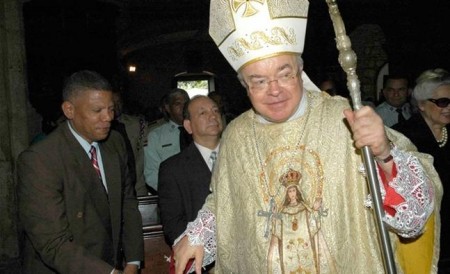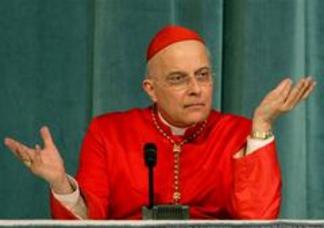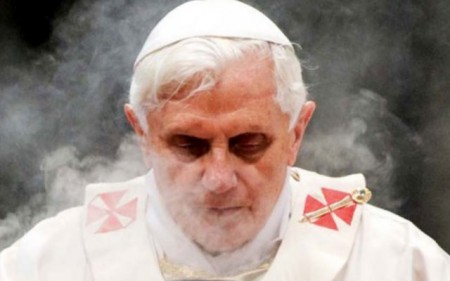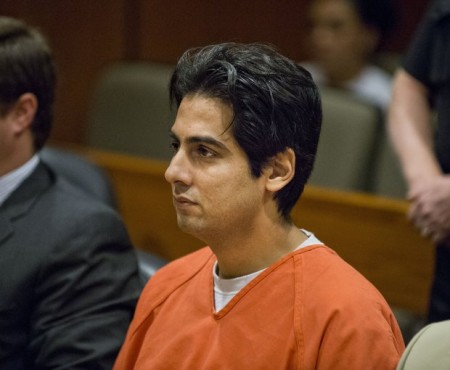Secrecy, Sophistry and Gay Sex in the Catholic Church — Book Report
Rev. Richard Wagner, PhD, ACS
This is a tough book to read. It covers a complex and detailed, 13-year-long administrative action to dismiss a Catholic priest from his Oblate Community. That’s the hard reading part, because the investigation and the proceedings were so convoluted, and there were hidden agenda on the part of his superiors. The priest is Father Richard Wagner, PhD, ACS, ordained in Oakland in 1975, and a self identified gay priest. The interesting part is the second half which is a verbatim printing of his PhD dissertation of 1981, Gay Catholic Priests, A Study of Cognitive and Affective Dissonance.
Richard Wagner is a psychotherapist, a clinical sexologist in private practice for over 30 years and the only Catholic priest in the world with a doctorate in Human Sexuality. His practice includes a special outreach to survivors of clergy sex abuse as well as clergy offenders. Wagner technically remains a Catholic priest, his “priestly faculties” have been removed and he is expelled from his religious order, the Missionary Oblates of Mary Immaculate.
It could be assumed that this kind of research work by a practicing priest would not endear himself to the Catholic Hierarchy or to the Vatican, who never cease to proclaim that ANY homosexual activity is sinful. They have a BRAND to protect. They try to contend that the Church loves the homosexual as a person, but condemns any active sexual behavior. And yet, Wagner proposed his thesis project to his Oblate Provincial Superior and it was approved, probably even to the next higher level of General Superior located in Rome.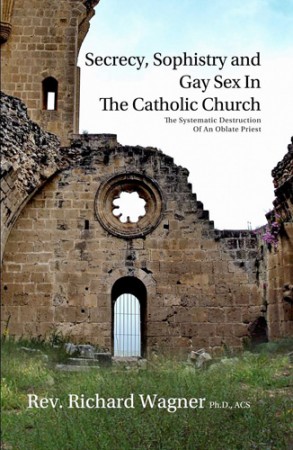
The dissertation was undertaken during his study at the Institute for the Advanced Study of Human Sexuality in San Francisco, where he was getting his PhD. It was a 3-year project, ending in 1981, when the dissertation was accepted. Just before that in 1980, he published an article in the liberal National Catholic Reporter (NCR) newspaper, Being Gay and Celibate–Another View. At that time, with the Church defending its strict views on sexuality across the board, the subject of the priesthood containing gay priests was not a subject that was encouraged. The early 1980s were also the time that the Bishop’s Club, USCCB, was becoming keenly aware that a serious child sexual abuse scandal was brewing, but so far they had been able to keep a lid on it. The stressful lives that homosexual priests led in the Catholic Church was an important subject to examine, not in the least, because there were a lot of them. And there were indications that many of them were ignoring the celibacy oath and engaging in forbidden sexual behavior.
Remember that the key Catholic ritual is the Mass and the Eucharist. The Eucharist requires regular Confession, and in the priesthood, one priest hears another’s confession. As a homosexual priest confesses his sins against his celibacy oath, other priests would be aware of what is going on. This is not to say that ANY priest confessor EVER revealed the secrets inside the confessional. Yet, the broad awareness of an active sexual culture was pretty commonplace.
As the 1962 Vatican II Council teachings swept over the global Church, they taught that the Church was more than the “Monarchial” Rome and the Hierarchical “Nobility.” In fact the term “People of God” was promulgated to mean that a big component of THE CHURCH was all of the people members. One outcome was that 125,000 priests globally left to get married or to lead civilian lives. To find enough recruits to re-fill the ranks, restrictions were relaxed to accept homosexual young men, who were already “out” and those who were still in the closet emotionally. These gay men were reaching their times of ordination in the late 1970s and early 80s. So the issue of gay priests in Wagner’s mind was of primary importance, as they struggled with a Church that was schizophrenic about this large cohort of new priests.
The panic among Church leaders of that time to Wagner’s research, stands in stark contrast to their apathetic response to the endemic child sexual abuse that has engulfed them, now for over thirty years. The tragic reason for their panic? The Church always uses the specter of gay priests as a scapegoat for ecclesiastical malfeasance to manipulate the faithful by bogus scandals involving homosexuality. The hierarchy just can’t seem to understand that gay people, both priests and society at large can experience a happy, healthy, life with integrated same-sex relationships. For the hierarchy, it’s all mixed in with pedophilia, making an outrageous and immensely destructive lie, to be fed to their doctrinaire disciples for the masses.
But living the life of a gay priest within the Catholic teachings in those years was lonely and scary and fraught with continuous misgivings. The Church had defined homosexuality as “Intrinsically Disordered,” while still proclaiming that gays were human beings and welcome into the community. And yet that welcome did NOT include homosexual behavior, meaning that there was to be NO genital sex. That would be the definition of celibacy, which ALL priests swear an oath to. BTW, I’m using the term HE and male throughout, but of course there are Lesbian nuns too, maybe a lot of them. Technically, celibacy applies to both heterosexuals and homosexuals, so it should not be any more repressive to one than the other. But in those years, being identified as homosexual was bad in both civilian life as in the life of the priesthood.
Wagner’s 1981 article in NCR was essentially his decision to reveal his homosexuality. Interestingly, he had previously revealed it during his acceptance interviews when he was applying for the seminary more than a decade before. His NCR declaration hit Rome and immediately there was kickback from the top command of the Oblates. In spite of the fact that he had already been “out” to his immediate superiors the wider publicity triggered a top down order to start proceedings for his dismissal from his priesthood. A part of the problem was that in editing his article some crucial content was deleted, somewhat changing his recommendations of how the Church should manage their considerable ranks of gay priests.
Worse was to come, because he had also agreed to an interview with a San Francisco Bay Scene 7 TV news program, done in a 2-hour session. While Wagner was very careful to ask the interviewer to restrict certain questions, he was also serious about not letting the content to be sensational. Unfortunately he was completely naive on protocol, and even with assurances with a member of the TV production team, the final cut trimmed the whole interview to a mere 15 minutes, and the questions preserved did in fact sensationalize the program. Instead of allowing any modifications, the producer brought in Fr. Gerald Coleman, an instructor in moral theology at the Catholic Major Seminary in Menlo Park, to add on a 5-minute rebuttal. So the combination was a disaster.
I remember Coleman, because our monthly diocesan newspaper, Valley Catholic, has a regular column by Coleman. His subject matter usually dealt with current media events, which had theological elements involved. I have always dismissed his writings because virtually every subject that he undertook got the most RIGID formulation of Church authority. So I can just imagine what the Coleman rebuttal did to Wagner’s position, which was already tenuous.
Dissertation. For the survey research, Wagner recruited 50 self-professed gay priests. It is not surprising that getting the right demographic sample was not just important, but quite difficult to achieve. He worked for a national distribution as even as he could, and winnowed an early 73 candidates down to 50. Candidate’s ages ranged from 27 to 58, with a median of 35. Among the potential candidates, there was a natural fear of reprisals and feelings of guilt. His search for candidates was aided by an existing informal network of gay priests, who supported each other in their lonely lives in a cold Church. Obviously, many of them in their vocations had to overcome what Wagner termed cognitive and affective dissonance. Recall also, that a very important part of Catholic life is the ritual Sacrament of Confession. Priests go to confession to other priests, so a gay priest, if he was sexually tempted or actually active, would be confessing those sins to another priest regularly.
The survey construction was modeled to a good extent by the well-known Kinsey sex behavior study of the early 1950s. The 34 survey questions were remarkably detailed to gain an understanding on the sexual awakening of the interviewee, and then on the practices of his present sexual behavior, along with considerable attitude discovery.
Dissertation Summary. The following is the verbatim summary section of the thesis, which is about 1/2 of the book :
1. The composite picture of the sexual behaviors of this sample of fifty gay priests reveals them to be sexually active. Forty-nine respondents are masturbating at a mean frequency nearly three times that reported by Kinsey in Sexual Behavior in The Human Male.
2. Fourteen respondents report a history of heterosexual coitus. Eight respondents report that this contact occurred after ordination; no one reports an occurrence within the past year.
3. Forty-eight respondents report a twice-a-week mean frequency of same-sex contact. The remaining two respondents are currently abstaining from same-sex contact. Interestingly enough, this sample has nearly five times the number of respondents reporting 500 or more total partners than Kinsey’s sample.
4. Overall, the respondents report enjoying their sexual activity while experiencing a minimum of sex-related guilt.
5. It was learned that 50% of the respondents had their first post-pubertal same-sex contact before entering the seminary; another 26% had their first experience during their seminary years.
6. The majority of the respondents, 62%, self-identified as gay before they were ordained, but only 46% had shared that identity with another person by that same time.
7. The respondents were almost unanimous in their rejection of official church positions regarding homosexuality and mandatory celibacy for priests. At the same time, nearly half of the respondents still experience some guilt because their lives do not reflect ecclesiastical expectations.
8. All but six report being unfulfilled in terms of intimacy needs by their priestly or religious lifestyle. Coupled with this is the recurring theme, appearing throughout the responses, of a desire for a lover by the majority of those who are currently without one. Only thirteen respondents report having a lover at this time.
9. The questions dealing with aspects of the priests’ dual identity were particularly revealing of the dissonance in their lives. The amount of discrimination experienced by the respondents for being gay in the church or for being a priest in the gay community is in direct proportion to the degree the priests are “out” to either group. Thus, when the majority of respondents report that they have not experienced hostility or oppression from either the gay community or the church, it is usually because they are still “closeted.” The path most frequently taken by the respondents in this regard is not to identify as gay in the church or as a priest in the gay community. This conflict is the source of much personal anguish and disappointment for the respondents.
This study reveals a group of highly motivated men, both professionally and sexually. The respondents seek integration and fulfillment in their personal lives as well as in their work, but they are often frustrated by what they report to be stifling role expectations put upon them by both the church and the gay community. While they are quick to criticize the shortcomings of both the church and the gay community, they report a sense of loyalty to and affection for both. It is as if both communities demand an exclusive commitment, one that would have them disown an integral part of their identity. This dissonance is reinforced by the respondents’ refusal to abdicate to either demand.
They are engaged in a process of questioning moral theology as well as reinterpreting traditional expectations of the celibate lifestyle in an effort to minimize the dissonance. Unfortunately, this process has been going on in secret. The fear of disclosure and possible reprisals has made this struggle a lonely one.
Impressions. For me there are two main impressions of this book:
1. Remembering that Wagner’s inquisition started in 1981, with the acceptance of his PhD dissertation, and the television interview, and ended in May, 1994, with the document that expelled him, his recall of the details of those 13 years is exception. He describes conversations with a presence that puts you right there, and augments those details with many letters and documents. I have to infer that he must have kept a diary of that difficult period.
Wagner uses abundant source material to detail how he, as a young Catholic priest, weathered a blistering 13-year battle with his religious community; only to be destroyed by the very Church he so loyally served. He is almost overly kind and tolerant, and forgiving of the mean-spirited bureaucrats of his own order as well as with the Church Hierarchy. His experience is remarkably similar to the treatment endured by lay Catholics going through the struggle of their lives, in the decades of child sexual abuse.
During those 13 years, there were many silent delays of years, then new alternatives would be proposed, including being subject to a process called an “obedience,” whereby Wagner would be ordered into a monastery for “prayer” and contemplation, and isolation. Wagner had to constantly weigh his options, whether he was going to do the right thing or do the thing that would protect his interests. And yet, at every step of the way, knowing his faith in the Church was implacable, he choose to do the right thing and paid the highest price of all for it.
The letters he includes present his side of the case of Inquisition, and they reveal the depth of the stone-cold prosecutions by the Church, which include some sideline proposals from Rome too. His immediate superior was his friend for years, they shared much comradeship, including the fact that his superior KNEW of his homosexuality for years. As the inquiry started, that superior was his enemy, no longer even open to reason. He includes a ‘swan song” letter he wrote to all of his comrades in the entire Oblate community.
2. The dissertation itself shocked me with its raw approach to the survey questions. There are sections on attitudinal and personal historical data, when the subject discerned he was gay, parent’s attitudes and behavior, and events that led to a call to the priesthood. The extent of the probing into sexual behavior is QUITE detailed, how often he masturbated, elements causing sexual arousal, first Fex contacts, intimate details on sex techniques (and I mean intimate), first times, and later frequencies. He makes tabular comparisons to the earlier Kinsey sex research for civilians.
Then he asked questions to develop the candidates’ present sexual activities, lovers? monogamy? how long relationships? what kinds of gay social procedures did he use, gay bars, out of town? anxiety of being found out? One survey answer mentioned that the gay priest was in an adjacent town at a gay bar, and ran into a Monsignor from his own diocese staff.
Considerable space was spent on compiling the interviewee’s attitudes on their life satisfaction, how they rationalized the Church’s strict rules with their lives. There were all manner of thought processes. for example, the Church Canon is absolute celibacy, yet some gay priests noted that that means “do not marry.” So, since they interpreted that it didn’t say, “no sex,” that they would just have sex.
I can just picture the bureaucrat in the Vatican Congregation of the Doctrine of the Faith, in around 1982, actually READING Wagner’s dissertation, and the survey results. Once he realized that this document was being reviewed by public media in the United States, he would be running down the hallway to the new Prefect of the Congregation, just installed in 1981. This was Eminence Ratzinger, the reactionary leader of the efforts of the Vatican Curia to reverse some of the liberating visions of the 1962 Vatican II Council. That vision certainly could NOT be allowed to include gay priests who were active socially. Father Wagner would ultimately pay the price of his revelation of reality.
–John Minck
Palo Alto, CA
June, 2013

